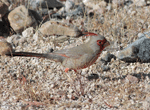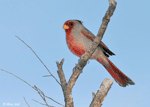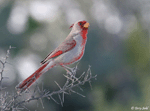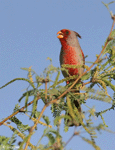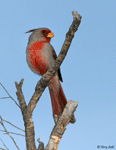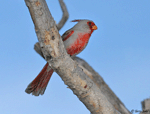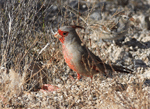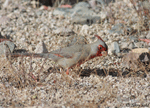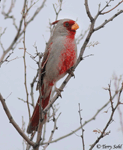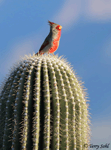| Length: 8.75 inches | Wingspan: 12 inches | Seasonality: Non-resident in South Dakota |
| ID Keys: Long pointed crest, unique curved bill, gray body, red face and belly (male) | ||
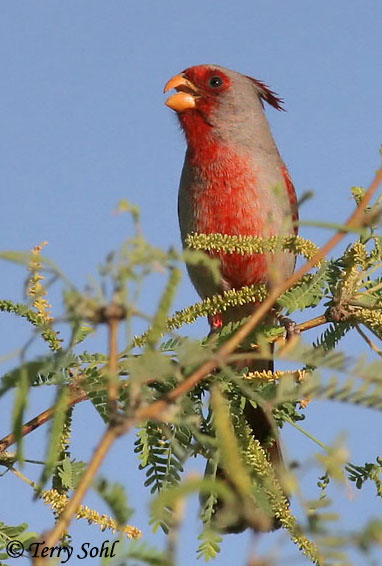 Pyrrhuloxia
are sometimes known as the "desert cardinal". They are closely related to
the Northern Cardinal, yet are only
found in the desert southwest of the United States, as well as in Mexico.
The unusual name comes from Greek terminology for the bill shape, in combination
with what was formerly part of the species' scientific name. Pyrrhuloxia
have similar habits and even a similar voice to the
Northern Cardinal. The ranges of
the two species even overlap, although Pyrrhuloxia can tolerate drier habitats
within that range. The two are similar in overall structure and at first
glance, a female Northern Cardinal may be confused with a Pyrrhuloxia, but upon
a closer look, the unique sharply curved bill of a Pyrrhuloxia is unique, as are
more subtle plumage differences.
Pyrrhuloxia
are sometimes known as the "desert cardinal". They are closely related to
the Northern Cardinal, yet are only
found in the desert southwest of the United States, as well as in Mexico.
The unusual name comes from Greek terminology for the bill shape, in combination
with what was formerly part of the species' scientific name. Pyrrhuloxia
have similar habits and even a similar voice to the
Northern Cardinal. The ranges of
the two species even overlap, although Pyrrhuloxia can tolerate drier habitats
within that range. The two are similar in overall structure and at first
glance, a female Northern Cardinal may be confused with a Pyrrhuloxia, but upon
a closer look, the unique sharply curved bill of a Pyrrhuloxia is unique, as are
more subtle plumage differences.
Habitat: Pyrrhuloxia are found in a variety of brushy and semi-open habitats. Typical habitats include stands of mesquite, acacia, brushy riparian areas, and dry canyons. During the winter, they will also wander into more open habitats, including farmland with brushy hedgerows, and open woodlands.
Diet: Omnivorous, with food items including insects and spiders, seeds, and fruits and berries. Mesquite seeds and fruit of cactus are often consumed in their dry habitats.
Behavior: Much of the species' foraging is done by hopping along the ground as they search for insects and seeds. Pyrrhuloxia will also hop and climb through shrubs and low in woodland canopy in search of food. While they are more solitairy during the nesting season, at other times of the year, they will often forage in small flocks.
Nesting: Pyrrhuloxia build a cup-shaped nest in dense shrubbery, or low in a woodland canopy.
Song:
The song of a Pyrrhuloxia is reminiscent of
a Northern Cardinal, with clear sharp
notes, but overall the song is crisper and higher-pitched.
Migration: Pyrrhuloxia frequent the same general range
year-round, but in winter, they may move to more open habitats than utilized
during the breeding season.
Interactive eBird Map:
Click here to access an interactive eBird map of Pyrrhuloxia sightings
Similar Species:
Northern Cardinal
Conservation Status:Populations are generally stable, especially as human
influences are often minimal on the dry habitats favored by the species.
Further Information: 1)
Wikipedia - Pyrrhuloxia
3)
Audubon Guide - Pyrrhuloxia
Photo Information: May 2008 - On the outskirts of
Tucson, Arizona - Terry Sohl
Additional Photos: Click on the image chips or
text links below for additional, higher-resolution Pyrrhuloxia photos.
Further Information: 1) Wikipedia - Pyrrhuloxia
3) Audubon Guide - Pyrrhuloxia
Photo Information: May 2008 - On the outskirts of Tucson, Arizona - Terry Sohl
Additional Photos: Click on the image chips or text links below for additional, higher-resolution Pyrrhuloxia photos.
| Click on the map below for a higher resolution view |
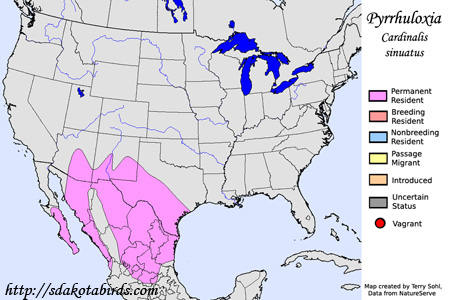 |
| South Dakota Status: Non-resident in South Dakota |
Additional Pyrrhuloxia Photos
Click for a higher-resolution version of these photos
